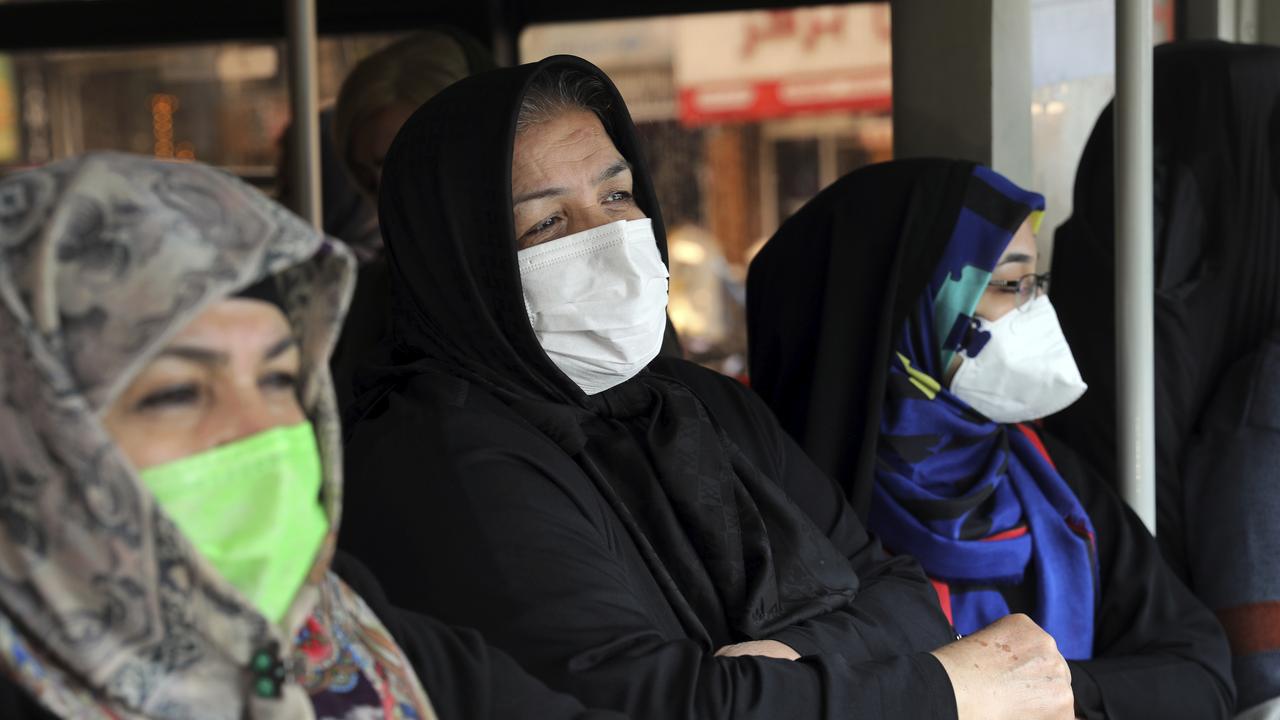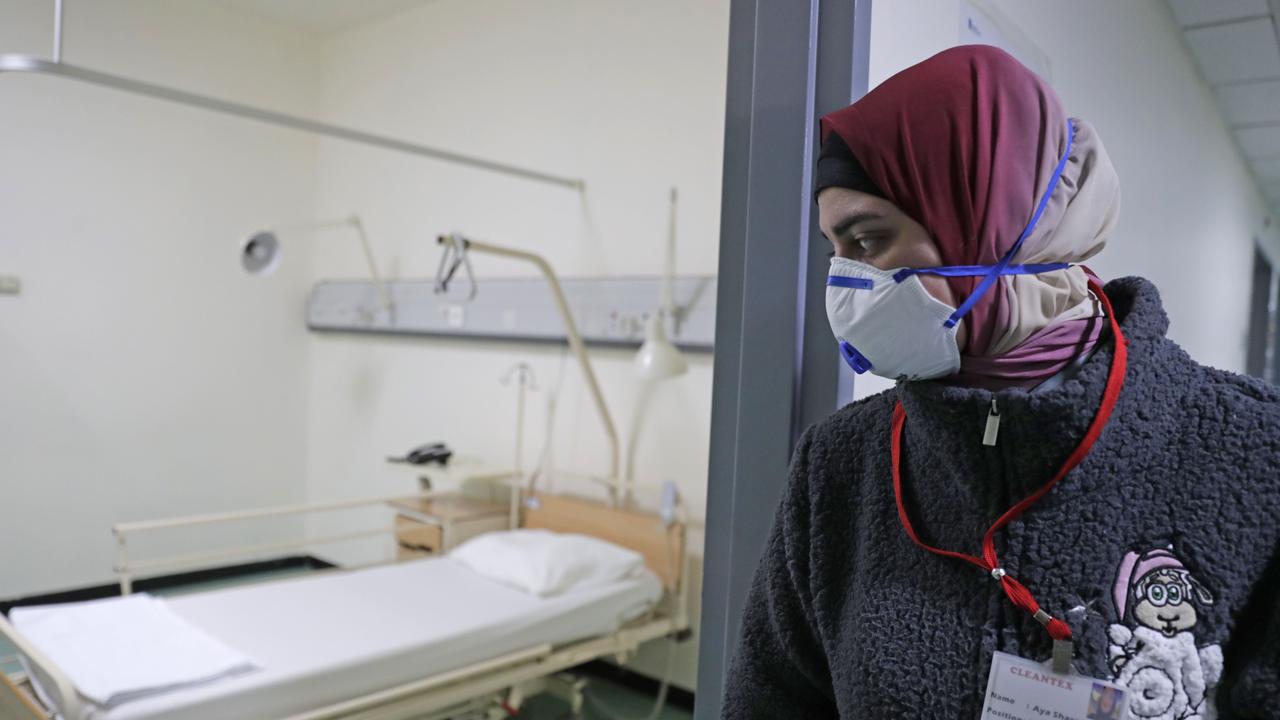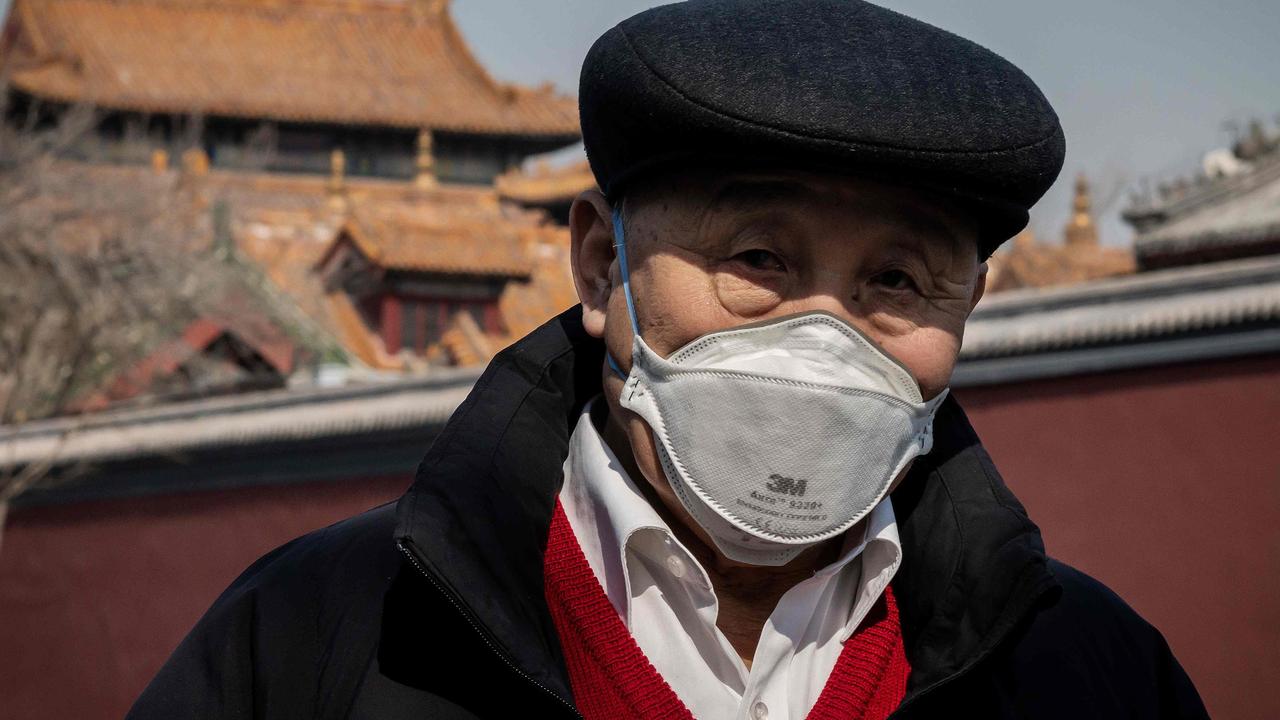Coronavirus is going global and containment is no longer an option
The coronavirus containment has broken, with cases exploding across the world. Now experts have revealed what to do to prepare.

Coronavirus has broken containment. It’s exploding across the world, from Italy to Singapore, South Korea and Japan.
Now Australian medicos are sounding the alarm: we must prepare for this pandemic to strike home, Soon.
There’s been a profound shift in the Covid-19 epidemic.
Health officials are being taken by surprise. New cases of the virus are appearing seemingly everywhere. And not all of them can be traced back to travellers.
That means it’s already loose. Deep inside communities, such as Italy and Japan.
That means it’s entering a new phase.
Last week, the World Health Organisation (WHO) warned that the “window of opportunity” to contain the disease was narrowing.
But many epidemiologists fear that may have already passed.
It’s in hospitals. It’s in prisons. It’s on cruise ships.
It seems to be spread by carriers long before they show symptoms themselves.
And that makes the virus almost impossible to contain.
So how bad is it?
University of Queensland associate professor in virology Ian Mackay yesterday queried a disease risk-assessment think-tank. He wanted to know the most responsible way to discuss the worsening Covid-19 outbreak.
So, he asked risk communicators Lanard & Sandman about whether it was time to start using the ‘P word’.
“Yes,” came the blunt reply.
“It is past time to say ‘pandemic’.”
The virus is likely to soon be loose in our own country, cities and towns.
ACTION STATIONS
The Centres for Disease Control (CDC) announced on Saturday it was initiating preparations for a “likely” spread of Covid-19 in the United States.
“We are reviewing all of our pandemic preparedness materials and adapting them to Covid-19,” an official told media.
On Sunday, Victoria’s Chief Health Officer Brett Sutton responded in kind.
“It’s clear that with local transmission in several countries that a pandemic is very likely, if not inevitable,” his official Twitter account reads. “We are working rapidly on planning and surge with our health sector.”
Our latest analysis support that of @mlipsitch and colleagues: At least 2/3 of cases in travellers from China to other countries have likely been missed. Surveillance is never perfect. https://t.co/NXUHzdJkRz
— neil_ferguson (@neil_ferguson) February 21, 2020
A new assessment by the Imperial College London warns the outbreak is likely dramatically worse than believed:
“We estimated that about two-thirds of Covid-19 cases exported from mainland China have remained undetected worldwide, potentially resulting in multiple chains of as yet undetected human-to-human transmission outside mainland China.”
This is sending shockwaves through international health circles.
In sum, many countries likely be dealing w COVID epidemic soon. They should be quickly preparing to deal, to do best they can w pt medical
— Tom Inglesby (@T_Inglesby) February 23, 2020
care, work to blunt overall impact, protect HCWs and keep health care system functioning safely, communicate clearly to public et al. 16/x
“In sum, many countries likely be dealing with a Covid epidemic soon,” responded the director of the Johns Hopkins Centre for Health Security in Baltimore, Tom Inglesby. “They should be quickly preparing to deal, to do best they can with medical care, work to blunt (its) overall impact, protect health care workers, keep health care system functioning safely and communicate clearly to the public.”
Risk group Lanard and Sandman say it’s important to point out that, while it looks like Covid-19 will go global, we don’t yet know how severe the disease is.
But, they add, the most “crucial (and overdue) risk communication task for the next few days” is to prepare the public for when the ‘keeping it out’ - containment - approach fails.
In other words, get ready for quarantine lockdowns.
RELATED: Follow updates on the coronavirus outbreak

‘TAKE THE RISK OF SCARING PEOPLE’
“In most countries – including our United States and your Australia – ordinary citizens have not been asked to prepare,” Lanard and Sandman write. “Instead, they have been led to expect that their governments will keep the virus from their doors.”
But such expectations are set to backfire.
And the risk assessors warn concerned academics and medicos to stand resolute in the face of accusations of ‘fear-mongering’.
“Take the risk of scaring people … It is better to get through this OMG moment now rather than later,” they write.
“Respond that hiding your strong professional opinion about this pandemic-to-be would be immoral, or not in keeping with your commitment to transparency, or unforgivably unprofessional, or derelict in your duty to warn, or whatever feels truest in your heart.
“You’re only darned if you warn about something that turns out minor,” Lanard and Sandman write. “But you’re damned, and rightly so, if you fail to warn about something that turns out serious.”
Australian National University infectious disease specialist Dr Sanjaya Senanayake agrees it is time to get prepared. But not to panic.
“Even though we don’t know at this point whether or not a pandemic will occur, governments should be prepared for one and send out reassuring messages to the public,” he told News Corp last night.
He says indications are it will be a disruptive disease. But not devastating.
“While a lot isn’t known about this virus, at this stage it appears to cause mild illness in the majority of people with a low case fatality rate. So while it will cause disruption for a time to health services and economies, they will eventually recover as more and more people become immune.”

CHANGING TACTICS
The director of the Center for Communicable Disease Dynamics at Harvard University, Marc Lipsitch, says containment no longer appears to be an option.
Instead, countermeasures must be identified and implemented.
“Most things we can do to slow the virus’s spread - isolation, quarantine, social distancing, cancelling public gatherings, treating cases with antivirals - are temporary,” he wrote. “Once let up, transmission can resurge.”
When a disease is established in a community, international travel bans become pointless. Instead of slowing its spread, it makes it harder to bring in urgently needed supplies and support.
So, Lanard and Sandman write, public health messages must switch from ‘stopping them from infecting us’ to ‘keeping us from infecting each other’.
That means cancelling mass events, considering school closures - and preparing for community lockdowns.
“We are near-certain that the desperate-sounding last-ditch containment messaging of recent days is contributing to a massive global misperception about the near-term future,” they write.
To counter this, public health officials should be talking about slowing the spread of the virus. Not stopping it.
“One horrible effect of this continued ‘stop the pandemic’ daydream masquerading as a policy goal (is that) it is driving counter-productive and outrage-inducing measures by many countries against travellers,” they write. “But possibly more horrible: The messaging is driving resources toward ‘stopping,’ and away from the main potential benefit of containment – slowing the spread of the pandemic and thereby buying a little more time to prepare for what’s coming.”

BUYING TIME
Lipsitch says slowing Covid-19’s spread will be difficult. Strict quarantine measures worked well for SARS in 2003 because isolating sick individuals prevented the disease from spreading.
Not so now.
“For Covid-19 it seems clear from individual well-documented cases that people can transmit before symptoms (become distinctive),” he wrote. “The key question - for which we (desperately) need good data - is whether this is common or rare. Some circumstantial evidence suggests it could be common.”
This limits the effectiveness of regular medical interventions. So practices such as social distancing (self-isolation), as well as “quarantine or lockdown” must be considered.
Slowing the spread of a virus through the community causes an epidemic to last longer - but with less ‘peak strain’ on health facilities.
“That is beneficial because: 1) fewer individuals get infected in total; 2) the burden on the health system is spread out, with lower peak demand for scarce resources; 3) we will know more as time goes on about how to care for patients, so it is better to get it late than early; 4) if we can spread it out enough there may be new drugs, vaccines, or other countermeasures to aid in preventing and treating infection.
“Summary: Delay is good.”
Another essential piece of unknown information is how the virus affects children.
So far, they seem strangely immune to Covid-19’s symptoms.
But are they innocent carriers?
“If kids are important for transmission, school closures may help; if not, less so,” Lipsitch writes.
And the delaying tactics are already producing results.
“Although a vaccine program is many months away, there are promising therapeutic options for treating people with the virus,” Dr Senanayake says.
BE PREPARED
In China, Covid-19 came from nowhere on January 1 to put the entire province of Wuhan in lockdown by February. Its rapid rate of spread can be seen again in Italy and Japan.
Can we cope?
“We’ve provided guidance to practitioners and many communications materials but are now focused on the models of care that will need to be in place - clinics, phone triage, home care, right through to ICU and aged care,” Sutton says.
Without rapid diagnostics ready to go, healthcare infrastructure may become rapidly inundated, even if cases turn out all negative - an abundance of caution will require quarantines until test rules out a case. Any backlog can quickly hamper hospitals. 4/7...
— Michael Mina (@michaelmina_lab) February 23, 2020
“Victoria and Australia nonetheless remain completely in containment mode - identifying any possible case; isolating those who are infectious; and quarantining contacts. Regardless of developments internationally, this gives all of us time and space to plan and prepare.”
But the response must be at all levels, Inglesby warns.
“Given the developments and trends of last few days, it’s clear governments need to be working intently with hospitals and health care systems to prepare to take care of Covid patients, possibly in high numbers,” he says.
Key among concerning Covid-19 developments is the number of cases appearing in countries outside China. And many of these aren’t linked to travellers ... indicating the virus is established in their general populations.
Inglesby says that, based on China’s experience, preparations should include:
• Preparing for a substantial increase in the numbers of patients who need oxygen and mechanical ventilation;
• Getting people with symptoms of Covid-19 diagnosed rapidly and correctly;
establishing the highest possible infection control procedures;
ensuring health care workers have high-quality personal protection equipment to keep them from being infected
• Preparing to give those with Covid-19 who are not sick enough to be in the hospital, instructions for home isolation and self-care, so they do not pose risks to hospitalised
• Evaluating whether there are public health interventions at community levels that might slow Covid-19 spread to create fewer numbers of very sick people all being in hospital at the same time
WHAT TO DO
Lanard and Sandman say preparedness advice must be spread: “Hardly any officials are telling civil society and the general public how to get ready for this pandemic.”
To allay panic, they say, health officials should be providing preparedness guidelines. This way worried people won’t be left feeling helpless. And the more people getting prepared, the more people will feel their community is ready.
“We are all stakeholders, and we don’t just want to hear what officials are doing. We want to hear what we can do, too,” they write.
“We want – and need – to hear advice like this:
• Try to get a few extra months’ worth of prescription meds, if possible.
• Don’t panic buy. But slowly build up your long-life grocery stocks to enough for a few weeks.
• Think through now how we will take care of sick family members while trying not to get infected.
• Cross-train key staff at work, so one person’s absence won’t derail our organisation’s ability to function.
• Practice touching our faces less. So how about a face-counter app like the step-counters so many of us use?
• Replace handshakes with elbow-bumps (the “ebola handshake”).
• Start practicing harm-reduction habits like pushing elevator buttons with a knuckle instead of a fingertip.
But the impact of a pandemic could also reach deep into businesses, supply chains and essential services.
“We have seen almost nothing in mainstream media citing this guidance, or recommending business continuity strategies like urgent cross-training so that core functions won’t be derailed because certain key employees are out sick, for instance.”
I'm speaking to my CHO counterparts daily and briefing the sector - and indeed all sectors - through our emergency management arrangements, under @CommissionerEMV. This is critical - pandemics challenge all sectors with effects on supply, workforce and business continuity. (4/6)
— Chief Health Officer, Victoria (@VictorianCHO) February 23, 2020
That message is now starting to get out.
At least at a state level.
“Australia absolutely has world-class healthcare, but even the best healthcare in the world is challenged during pandemics,” Sutton says. “We’ve got some of the brightest minds in the world in our health services, laboratories, research sector and emergency management sector. I’m confident we’re well placed to meet the challenges ahead, whatever they might be. Hoping for the best and planning for the worst.”
Dr Senanayake agrees: “Again, it is important to communicate the message to the public that a pandemic doesn’t always mean a catastrophic outcome, especially since the majority of cases with this virus seem to be mild. It will certainly be an imposition, but likely a temporary one.”




